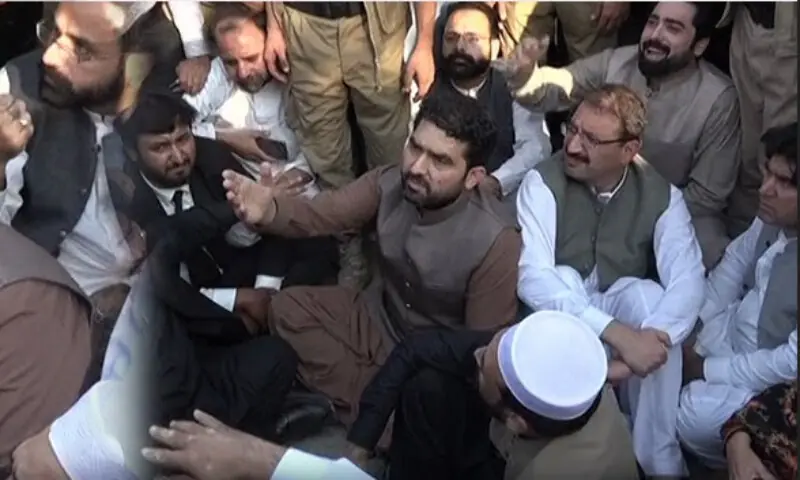Permission Granted, But Meeting Blocked
Khyber Pakhtunkhwa Chief Minister Sohail Afridi was prevented from meeting the founder of Pakistan Tehreek-e-Insaf (PTI), Imran Khan, at Adiala Jail in Rawalpindi, despite holding official permission from the Islamabad High Court.
Afridi had secured a court order allowing him to meet the jailed PTI founder, who has been detained since last year on multiple charges. Acting on that legal approval, Afridi left Peshawar earlier in the day and arrived in Rawalpindi, expecting a scheduled meeting inside the prison.
However, as his convoy approached the Dhagal checkpoint near Adiala Road — a few kilometres from the jail — local police blocked the route, citing security concerns.
Standoff at Dhagal Checkpoint
The standoff quickly drew attention as Afridi stepped out of his vehicle and questioned police officers about their refusal to allow him through. According to witnesses, the chief minister produced the written court permission, insisting that meeting the PTI founder was his legal and constitutional right.
When the officers refused to budge, Afridi sat down on the road in protest. Several party leaders, including members of his cabinet and local lawmakers, joined him in a brief, symbolic sit-in. Supporters gathered around the scene, chanting slogans in favour of Afridi and against the authorities.
Traffic along Adiala Road was disrupted for a short time, though police redirected vehicles to maintain the flow. A heavy contingent of law enforcement personnel, including riot police, was deployed to prevent the situation from escalating.
Peaceful Resolution After Brief Protest
After nearly an hour of peaceful protest, Afridi decided to end the sit-in. Addressing his supporters, he reiterated that the court had allowed him to meet Imran Khan and condemned what he described as an unlawful obstruction of justice.
Soon after his statement, the chief minister left the site with his delegation. Police later reopened the blocked road, restoring traffic to normal. Just days earlier, Afridi had also staged a brief sit-in in Rawalpindi over similar issues of political obstruction. Officials told reporters that the decision to halt Afridi’s convoy was taken for security management near the high-security Adiala Jail, which also houses several high-profile inmates.
Broader Political Context
The incident comes amid heightened political tensions across Pakistan. Since former Prime Minister Imran Khan’s arrest in 2023, many of his party members have faced restrictions, detentions, or limitations on public meetings.
The Islamabad High Court has occasionally granted permission for political figures and family members to visit Khan, but these meetings are often delayed or blocked by local authorities citing security risks. Analysts say this pattern reflects the growing disconnect between judicial rulings and administrative implementation.
In recent months, Pakistan has witnessed several small-scale protests and demonstrations by PTI supporters demanding greater transparency, political freedom, and access to their party’s founder. Afridi’s protest, though symbolic, underscores the persistent tension between provincial leaders aligned with PTI and federal security institutions.
Security and Political Implications
Adiala Jail, located on the outskirts of Rawalpindi, is among Pakistan’s most secure facilities, housing political figures, militants, and white-collar crime suspects. Security protocols around the facility have been intensified since Imran Khan’s imprisonment, with authorities citing threats of unrest.
Observers suggest that denying Afridi entry, despite a valid court order, may further strain relations between the federal and Khyber Pakhtunkhwa governments. The province, governed by PTI, has been increasingly vocal about what it calls the “selective enforcement” of laws against its leaders.
Calm Restored, But Questions Remain
By evening, the situation had fully normalized, with police reporting no violence or arrests. However, the brief standoff has raised new questions about the implementation of court decisions and the limits of political authority in Pakistan’s current climate.
As one political analyst in Islamabad noted, Such incidents reflect a deeper struggle over institutional power — between the judiciary, provincial governments, and security agencies. Afridi’s protest may have ended peacefully, but the political ripples are likely to continue.















